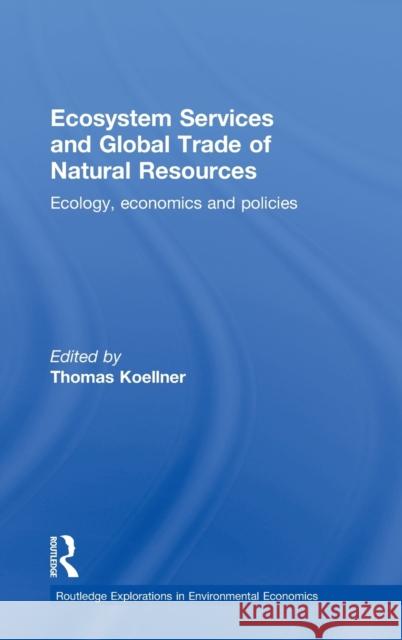Ecosystem Services and Global Trade of Natural Resources: Ecology, Economics and Policies » książka
Ecosystem Services and Global Trade of Natural Resources: Ecology, Economics and Policies
ISBN-13: 9780415485838 / Angielski / Twarda / 2011 / 312 str.
Ecosystem Services and Global Trade of Natural Resources: Ecology, Economics and Policies
ISBN-13: 9780415485838 / Angielski / Twarda / 2011 / 312 str.
(netto: 695,40 VAT: 5%)
Najniższa cena z 30 dni: 705,23
ok. 22 dni roboczych
Bez gwarancji dostawy przed świętami
Darmowa dostawa!
The utilization of natural resources to satisfy worldwide growing consumption of goods and services has severe ecological consequences. Aside from the projected doubling of food consumption in the next fifty years, the growing trade of biofuels and other commodities is a global challenge as the economic activities in the primary sector (i.e. mining, fisheries, aquaculture, forestry and agriculture) can damage biodiversity and ecosystem services. This should be taken into account in the decision-making affecting the global value chains linking consumer, retailer, processor, and producer in the North and the South. To cover the topic of ecosystem services and global trade this book is organized into four major parts. Part 1 gives the theoretical framework from an ecological, economic and political perspectives. Part 2 explores how internationally traded biophysical commodities from agriculture, forestry and fisheries translates into a virtual flow of land, freshwater, and marine ecosystems. Part 3 describes how two widely used accounting tools (i.e., Life Cycle Assessment and Green National Accounts) deal with international aspects of ecosystem services, and Part 4 shows how instruments like labelling, bans, or payments for ecosystem services in the private and public sector can influence trade patterns and the management of ecosystem services. This collection is a valuable contribution to the global change science dealing with ecosystem services. It illustrates the consequences of international trade on global ecosystem services and provides an overview of accounting tools and of market-based policy instruments to address negative and positive externalities. The book is certainly innovative, because it brings together research findings from distinct disciplines especially Industrial Ecology and Ecosystem Sciences, as well as Environmental Economics and Political Science.











